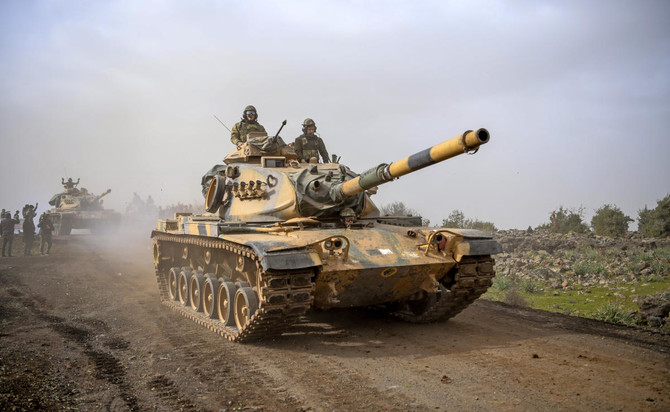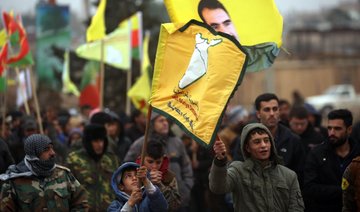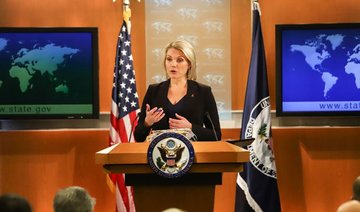ANKARA: Turkey claimed the capture of 15 Kurdish-held villages on Monday on the third day of Operation Olive Branch aimed at driving out Syrian Kurdish forces of the People’s Protection Units (YPG) from their Afrin enclave in northwest Syria.
Turkish artillery shelled YPG targets inside Syria and ground troops opened a new front by moving on Afrin from the town of Azaz to the east.
The Britain-based Syrian Observatory for Human Rights said 21 civilians, six of them children, had been killed in the operation.
Ankara denied causing civilian casualties, and Foreign Minister Mevlut Cavusoglu accused the YPG of sending out “nonsense propaganda and baseless lies.”
France called for a UN Security Council meeting on Monday to discuss concerns over flashpoint areas in Syria, including the Turkish offensive. But President Recep Tayyip Erdogan said Turkey had Russia’s support for the operation and would not back down. “We are determined. Afrin will be sorted out. We will take no step back,” he said in a televised speech in Ankara.
In a sign of the risks to Turkey, 11 rockets fired from Syria hit the Turkish border town of Reyhanli on Sunday, killing one Syrian refugee and wounding 46 people, 16 of them Syrian.
Turkey’s Prime Minister Binali Yildirim said 170 Kurdish military targets had been destroyed since Saturday and the Turkish army had suffered no losses.
Turkish authorities detained 24 people on Monday accused of posting “terror propaganda” on social media in support of the YPG and against the military operation. Ankara views the YPG and its political wing the PYD (Democratic Union Party) as terrorist groups linked to the outlawed PKK.
NATO Deputy Secretary-General Rose Gottemoeller met Turkish officials in Ankara on Monday and said all countries had the right to self-defense, provided “this is done in a proportionate and measured way.”
Turkey claims to have captured up to 8km of territory in Afrin, and Naim Baburoglu, a military strategist and retired Turkish brigadier general, told Arab News he did not expect the operation to last much longer.
“In each military operation, there should be a political objective which precedes military targets,” he said. “For this one, Turkey wants to neutralize the PYD, to prevent a Kurdish corridor from reaching to the Mediterranean shores and to preserve Syria’s territorial integrity.”
Afrin was merely a tactical operation, he said, while the strategic objective was to eradicate the PYD threat east of the Euphrates, and the offensive was likely to be extended in that direction.
“If not, Turkey’s territorial integrity and border security will still be under threat from the PYD presence in the region in the short to medium term,” Baburoglu said.
Kerim Has, a lecturer in Turkish-Russian relations at Moscow University, warned that if the Turkish army suffered heavy losses in the offensive and sought further Russian military, political and diplomatic support, this would change the whole picture in Syria, Turkey and throughout the region.
“Requests to Russia from Ankara in such a scenario can directly cause a sharp and irrevocable break in Turkey-NATO relations,” he told Arab News.
The US State Department has already asked Turkey to restrict the scope of the operation and “to exercise restraint.” Defense Secretary Jim Mattis said Turkey had been “candid” and had informed Washington beforehand about its operation.
Sakir Dincsahin, a Middle East expert from Hasan Kalyoncu University in Gaziantep, told Arab News: “Russia’s influence in the region has risen considerably and it has become a real power broker in Syria. So Moscow’s diplomatic support for the operation contributes a lot to its success.”
Washington was losing influence over Turkey because of its close partnership with the YPG and its latest attempt to establish a Kurdish-led border security force, he said.
“And at the same time it will also suffer an enormous image loss as it is currently not in a position to safeguard its local PYD/PKK allies from Turkish attacks.”
Turkey claims capture of 15 villages on Day 3 of Afrin offensive
Turkey claims capture of 15 villages on Day 3 of Afrin offensive

Tens of thousands of Palestinians flee West Bank refugee camps

- The camps, built for descendants of Palestinian refugees who fled or were driven from their homes in the 1948 war around the creation of the state of Israel, have long been major centers for armed militant groups
JERUSALEM: Tens of thousands of Palestinians living in refugee camps in the occupied West Bank have left their homes as a weeks-long Israeli offensive has demolished houses and torn up vital infrastructure in the heavily built up townships, Palestinian authorities said.
Israeli forces began their operation in the refugee camp in the northern West Bank city of Jenin on Jan. 21, deploying hundreds of troops and bulldozers that demolished houses and dug up roads, driving almost all of the camp’s residents out.
“We don’t know what’s going on in the camp but there is continuous demolition and roads being dug up,” said Mohammed Al-Sabbagh, head of the Jenin camp services committee.

The operation, which Israel says is aimed at thwarting Iranian-backed militant groups in the West Bank, has since been extended to other camps, notably the Tulkarm refugee camp and the nearby Nur Shams camp, both of which have also been devastated. The camps, built for descendants of Palestinian refugees who fled or were driven from their homes in the 1948 war around the creation of the state of Israel, have long been major centers for armed militant groups. They have been raided repeatedly by the Israeli military but the current operation, which began as a ceasefire was agreed in Gaza, has been on an unusually large scale. According to figures from the Palestinian Authority, around 17,000 people have now left Jenin refugee camp, leaving the site almost completely deserted, while in Nur Shams 6,000 people, or about two thirds of the total, have left, with another 10,000 leaving from Tulkarm camp.
“The ones who are left are trapped,” said Nihad Al-Shawish, head of the Nur Shams camp services committee. “The Civil Defense, the Red Crescent and the Palestinian security forces brought them some food yesterday but the army is still bulldozing and destroying the camp.” The Israeli raids have demolished dozens of houses and torn up large stretches of roadway as well as cutting off water and power, but the military has denied forcing residents to leave their homes.
“People obviously have the possibility to move or go where they want, if they will. But if they don’t, they’re allowed to stay,” Lt. Col. Nadav Shoshani told reporters.
The operation began as Israel moved to banish the main UN Palestinian relief organization UNRWA from its headquarters in East Jerusalem and cut it off from any contact with Israeli officials.
The ban, which took effect at the end of January, has hit UNRWA’s work in the West Bank and Gaza, where it provides aid for millions of Palestinians in the refugee camps.
Israel has accused UNRWA of cooperating with Hamas and said some UNRWA workers even took part in the Hamas-led attack on communities in southern Israel on Oct. 7, 2023 that set off the 15-month war in Gaza.
Tens of thousands of Palestinians flee West Bank refugee camps

- The camps, built for descendants of Palestinian refugees who fled or were driven from their homes in the 1948 war around the creation of the state of Israel, have long been major centers for armed militant groups
JERUSALEM: Tens of thousands of Palestinians living in refugee camps in the occupied West Bank have left their homes as a weeks-long Israeli offensive has demolished houses and torn up vital infrastructure in the heavily built up townships, Palestinian authorities said.
Israeli forces began their operation in the refugee camp in the northern West Bank city of Jenin on Jan. 21, deploying hundreds of troops and bulldozers that demolished houses and dug up roads, driving almost all of the camp’s residents out.
“We don’t know what’s going on in the camp but there is continuous demolition and roads being dug up,” said Mohammed Al-Sabbagh, head of the Jenin camp services committee.

The operation, which Israel says is aimed at thwarting Iranian-backed militant groups in the West Bank, has since been extended to other camps, notably the Tulkarm refugee camp and the nearby Nur Shams camp, both of which have also been devastated. The camps, built for descendants of Palestinian refugees who fled or were driven from their homes in the 1948 war around the creation of the state of Israel, have long been major centers for armed militant groups. They have been raided repeatedly by the Israeli military but the current operation, which began as a ceasefire was agreed in Gaza, has been on an unusually large scale. According to figures from the Palestinian Authority, around 17,000 people have now left Jenin refugee camp, leaving the site almost completely deserted, while in Nur Shams 6,000 people, or about two thirds of the total, have left, with another 10,000 leaving from Tulkarm camp.
“The ones who are left are trapped,” said Nihad Al-Shawish, head of the Nur Shams camp services committee. “The Civil Defense, the Red Crescent and the Palestinian security forces brought them some food yesterday but the army is still bulldozing and destroying the camp.” The Israeli raids have demolished dozens of houses and torn up large stretches of roadway as well as cutting off water and power, but the military has denied forcing residents to leave their homes.
“People obviously have the possibility to move or go where they want, if they will. But if they don’t, they’re allowed to stay,” Lt. Col. Nadav Shoshani told reporters.
The operation began as Israel moved to banish the main UN Palestinian relief organization UNRWA from its headquarters in East Jerusalem and cut it off from any contact with Israeli officials.
The ban, which took effect at the end of January, has hit UNRWA’s work in the West Bank and Gaza, where it provides aid for millions of Palestinians in the refugee camps.
Israel has accused UNRWA of cooperating with Hamas and said some UNRWA workers even took part in the Hamas-led attack on communities in southern Israel on Oct. 7, 2023 that set off the 15-month war in Gaza.
More than one million Syrians return to their homes: UN

- “Since the fall of the regime in Syria we estimate that 280,000 Syrian refugees and more than 800,000 people displaced inside the country have returned to their homes,” Filippo Grandi, the UN High Commissioner for Refugees
GENEVA: More than one million people have returned to their homes in Syria after the overthrow of Bashar Assad, including 280,000 refugees who came back from abroad, the UN said on Tuesday.
Assad was toppled in December in a rebel offensive, putting an end to his family’s decades-long grip on power in the Middle Eastern country and bookmarking a civil war that broke out in 2011, with the brutal repression of anti-government protests.
Syria’s war has killed more than half a million people and displaced millions from their homes.
The Islamist-led rebels whose offensive ousted Assad have sought to assure the international community that they have broken with their past and will respect the rights of minorities.
“Since the fall of the regime in Syria we estimate that 280,000 Syrian refugees and more than 800,000 people displaced inside the country have returned to their homes,” Filippo Grandi, the UN High Commissioner for Refugees, wrote on the X social media platform.
“Early recovery efforts must be bolder and faster, though, otherwise people will leave again: this is now urgent!” he said.
At a meeting in Paris in mid-February, some 20 countries, including Arab nations, Turkiye, Britain, France, Germany, Canada and Japan agreed at the close of a conference in Paris to “work together to ensure the success of the transition in a process led by Syria.”
The meeting’s final statement also pledged support for Syria’s new authorities in the fight against “all forms of terrorism and extremism.”
Algiers slams French minister’s visit to W. Sahara

- France’s stance on Western Sahara has been ambiguous in recent years, often straining its ties with Morocco
ALGIERS: Algeria on Tuesday denounced a visit by French Culture Minister Rachida Dati to Western Sahara, after Paris recognized Moroccan sovereignty over the disputed territory, as “objectionable on multiple levels.”
The vast desert territory is a former Spanish colony largely controlled by Morocco but claimed for decades by the Algeria-backed Polisario Front.
Dati, who described her visit as “historic,” launched with Moroccan Culture Minister Mohamed Mehdi Bensaid a French cultural mission in the territory’s main city, Laayoune.
An Algerian foreign ministry statement posted on social media Tuesday said the visit “reflects blatant disregard for international legality by a permanent member of the UN Security Council.”
“This visit reinforces Morocco’s fait accompli in Western Sahara, a territory where the decolonization process remains incomplete and the right to self-determination unfulfilled,” it said.
Dati’s trip, a first for a French official, “reflects the detestable image of a former colonial power in solidarity with a new one,” the statement added.
The United Nations considers Western Sahara to be a “non-self-governing territory” and has had a peacekeeping mission there since 1991, whose stated aim is to organize a referendum on the territory’s future.
But Rabat has repeatedly rejected any vote in which independence is an option, instead proposing autonomy under Morocco.
France’s stance on Western Sahara has been ambiguous in recent years, often straining its ties with Morocco.
But in July, French President Emmanuel Macron said Rabat’s autonomy plan was the “only basis” to resolve the Western Sahara dispute.
Algeria has backed the separatist Polisario Front and cut diplomatic relations with Rabat in 2021 — the year after Morocco normalized ties with Israel under a deal that awarded it US recognition of its annexation of the Western Sahara.
In October, the UN Security Council called for parties to “resume negotiations” to reach a “lasting and mutually acceptable solution” to the Western Sahara dispute.
In November 2020, the Polisario Front said it was ending a 29-year ceasefire with Morocco after Moroccan troops were deployed to the far south of the territory to remove independence supporters blocking the only road to Mauritania.
The Polisario Front claims the route is illegal, arguing that it did not exist when the ceasefire was established in 1991.




















